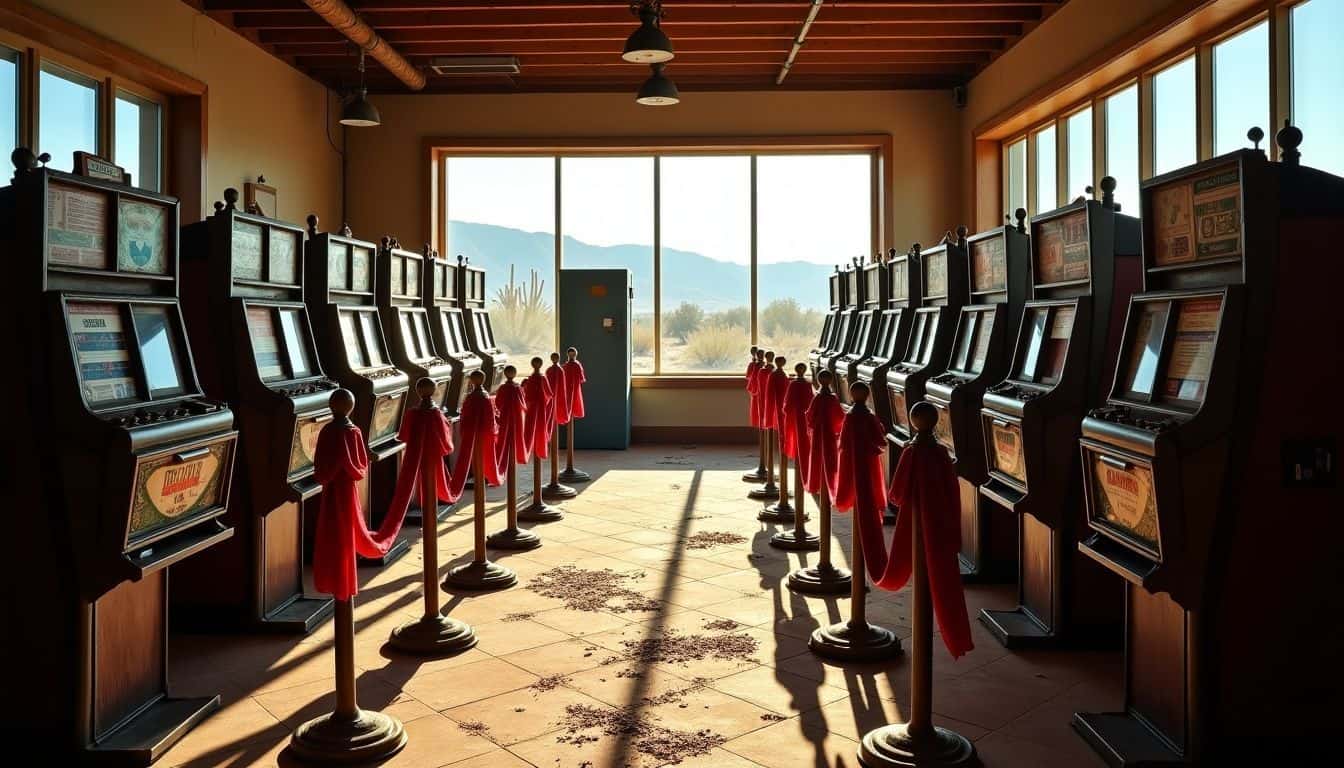Abandoned casinos hold secrets that most people never get to explore. These once-bustling gambling spots now stand empty, with dusty slot machines and forgotten poker tables. Inside their crumbling walls, you’ll find amazing stories of luxury, scandal, and lost fortunes from places like Croatia to Cambodia.
Ready to peek behind those rusty doors?
Key Takeaways
Abandoned casinos like Croatia’s Penthouse Adriatic Club Casino (built 1972 for $45 million) and Romania’s Constanta Casino (built 1910) show how quickly fortunes can change.
The Bokor Palace Hotel and Casino in Cambodia had a dark beginning, with over 900 workers dying during its construction in the 1920s before closing in 1964 due to gambling-related deaths.
Many abandoned casinos found new life through different uses – the Asbury Park Casino became a skate park, while the King’s Inn Casino in Reno turned into apartments in 2014.
Fire destroyed several famous casinos, including the Key Largo Casino (burned twice in 2008 and 2013) and the Montgomery Pass Casino, once the world’s highest casino at 7,167 feet.
These empty gambling palaces now serve as popular spots for artists, photographers, and filmmakers who capture their faded glory through various creative works.
Table of Contents
The Enchantment of Vacant Casinos

Empty casinos hold a strange magic that pulls people in. These grand buildings tell stories of past glory days, with their fancy designs still showing through broken windows and dusty halls.
More and more people now play slot games online, leaving these once-bustling places quiet and empty. The Stardust Resort and Casino on the Vegas Strip stands as proof of how times change.
Its star-covered walls and neon signs still grab attention, even though nobody has played there in years.
These silent temples of chance whisper tales of fortunes won and lost – Frank Morrison, Casino Historian
The glamour stays frozen in time inside these places. Fancy chandeliers hang above empty gaming floors where high rollers once bet big money. Places like the Bokor Palace Hotel and Casino in Cambodia mix spooky beauty with history.
Their detailed architecture shows how much care went into making these spots special. Ghost towns have formed around some old casinos, making them perfect for exploring urban ruins.
Let’s check out some famous deserted gambling spots around the world.
Famous Deserted Casinos Globally

Abandoned casinos stand as silent witnesses to past glories, from the shores of the Adriatic Sea to the misty mountains of Cambodia. These once-bustling palaces of chance now draw urban explorers and photographers who search through their crumbling halls for hidden treasures, old poker chips, and forgotten stories of high-stakes games.
Penthouse Adriatic Club Casino, Croatia

The Penthouse Adriatic Club Casino stands as a ghost of 1970s luxury on Croatia’s stunning coastline. Bob Guccione, the mastermind behind Penthouse magazine, poured $45 million into this lavish playground back in 1972.
The casino mixed Vegas-style glamour with European charm, drawing high-rollers from across the globe. Its marble floors and crystal chandeliers spoke of money and power during its brief golden age.

The party ended faster than anyone expected. The casino crashed into bankruptcy just one year after opening in 1973. Stories say Saddam Hussein and his family once walked these halls, but now only broken windows and peeling paint remain.
The casino closed its doors to visitors in 2001, leaving behind empty gaming tables and silent slot machines. Today, the building sits frozen in time, its once-bustling gaming floors now home to dust and memories of its short-lived glory days.
Constanta Casino, Romania

The grand Constanta Casino stands proud on Romania’s Black Sea coast. Built in 1910, this Art Nouveau masterpiece replaced an old wooden structure that burned down in 1892. Red Cross workers turned it into a hospital during both World Wars, where it faced heavy bombing damage.
Russian royalty once walked through its ornate halls, making it a symbol of luxury in its prime years.
Every crack in these walls tells a story of war, glamour, and survival – Local historian
Life hasn’t been kind to this seaside beauty. Europe marked it as one of its seven most endangered landmarks in 2018. Good news came in late 2020 when renovation work started to bring back its former glory.

Its white walls and fancy dome still catch every visitor’s eye, even after years of sitting empty. I walked through its halls last summer, and the mix of faded grandeur with ocean views left me speechless.
Bokor Palace Hotel and Casino, Cambodia

Moving east from Romania’s Black Sea coast, we find another haunting casino in Cambodia’s mountains. The Bokor Palace Hotel and Casino stands as a ghostly reminder of French colonial rule.
French builders lost 900 workers during its construction in the 1920s. The casino opened to serve wealthy French visitors who needed a break from Cambodia’s heat.
Life at Bokor Palace took dark turns through the years. It became a military hospital in the First Indochina War. The casino tried to restart in 1962 but closed fast after several guests died by suicide.
Empty halls and broken windows marked its abandonment in the 1990s. Today, the building has new life as a fancy 36-room hotel with restaurants. Still, old-timers say the place keeps its spooky past alive in every shadow and corner.
Asbury Park Casino, USA

Asbury Park Casino stands as a ghost of America’s grand boardwalk era. Built in 1929, this New Jersey landmark once buzzed with theaters, shops, and a busy roller-skating arena. Visitors flocked to catch stunning Atlantic Ocean views while enjoying the entertainment hub.
The casino’s glory days faded in the 1980s, but parts of it still breathe life today.
The old structure got a fresh start in the 1990s when its famous carousel reopened. A modern skate park joined the scene in the 2000s, bringing new energy to the historic spot. The building’s bones tell stories of packed summer nights and endless boardwalk fun.
Today, street artists use its walls as canvas, mixing past glamour with raw urban art. Tourists still snap photos of its weathered facade, proving some treasures get better with age.
Jubilation Riverboat Casino, USA

The Jubilation Riverboat Casino started its life as the SS Nantucket ferry before becoming the SS Naushon. This floating casino sailed into troubled waters right from the start. The owners spent $1.5 million to turn it into the Cotton Club Riverboat Casino in 1993.
Fancy slot machines lined its decks, and table games filled its halls.
Bad luck struck this gambling vessel hard and fast. The casino shut down after only seven months due to money problems. Today, the once-proud riverboat sits empty and forgotten. Its slot machines gather dust, and its gaming tables rot away in silence.
The empty halls tell stories of lost bets and broken dreams. The casino stands as a ghost ship, marking another chapter in America’s gambling history.
Casino di Consonno, Italy

Near Milan lies a forgotten gambling paradise called Casino di Consonno. Mario Bagno dreamed up this spot as Italy’s answer to Las Vegas, complete with fancy restaurants and hotels.
His vision turned this quiet village into a “City of Toys” – a playground for rich folks looking to learn from James Bond at the gaming tables. Sadly, Mother Nature had other plans.

Nature struck back hard at this gambling hotspot. A massive landslide wiped out the main road, cutting off access to the casino. Now, the once-bustling halls sit empty and quiet. Broken windows and crumbling walls tell stories of failed attempts to bring back its glory days.
Some parts remain private property, keeping their secrets locked away from curious eyes. This Italian gem stands as a stark reminder of how quickly fortunes can change in the gambling world.
Behind the Silence: The Stories of Abandoned Casinos

Dead casinos tell dark tales of broken dreams and lost fortunes. The Penthouse Adriatic Club Casino shut its doors after just one year, leaving behind empty poker tables and silent slot machines.
Each abandoned gaming house holds stories of bad luck and poor choices. The Constanta Casino in Romania switched from games to healing during both World Wars. Its grand halls turned into hospital beds for wounded soldiers.
These empty buildings paint a picture of tough times and quick falls from glory. The Bokor Palace Hotel and Casino stands as a grim reminder of human cost, with 900 workers dying during its build.
Money problems hit the Jubilation Riverboat Casino hard, forcing it to close after seven months. Bad weather destroyed the main road to Casino di Consonno, turning it into a ghost town.
The bright lights of Asbury Park Casino dimmed in the 1980s, leaving only empty halls and faded memories of its glory days on the Jersey Shore.
Artistic and Cultural Significance of Deserted Casinos

Deserted casinos stand as time capsules of past glamour and artistry. These grand structures, like the Constanta Casino in Romania, show off fancy architecture from decades ago. Artists flock to these empty buildings to capture their faded beauty through photos and paintings.
The worn-out walls and broken windows tell stories of busy nights filled with laughter and excitement. Many photographers from Getty Images have turned these silent halls into stunning art pieces.
These old casinos teach us about different cultures and times. Places like Bokor Palace Hotel and Casino survived the Vietnamese invasion and now draw history buffs from around the world.
The Asbury Park Casino in New Jersey keeps its spot as a cultural landmark. Local groups fixed up parts of it to host art shows and music events. Empty gaming floors that once held slots and betting tables now serve as perfect spots for museum displays.
Each crack in the wall and dusty chandelier adds to their charm as cultural treasures.
People Also Ask
What happened to the famous Sahara Las Vegas casino?
The Sahara Las Vegas turned into SLS Las Vegas in 2011. Like many old casinos on the Las Vegas Strip, it changed hands several times. Now, parts of the original building still hide old gaming tables and slot machines.
Why did the Key Largo Casino and Hotel close down?
Located near Reno, Nevada, the Key Largo Casino closed due to tough competition from newer places like Silver Legacy. Local stories say there’s still old casino chips and gaming equipment locked away in its basement.
What treasures might be found in The Desert Inn?
Before becoming the Wynn Las Vegas, The Desert Inn held many secrets. People say old house edges calculation books and rare game of chance equipment remain sealed in hidden rooms.
Are there any abandoned casinos worth visiting in Atlantic City?
Atlantic City, near Asbury Park, New Jersey, has several closed casinos. The Borgata area holds some of these old buildings. Many still have their original safes and gaming floors intact.
What makes the Haludovo Palace Hotel special?
The Haludovo Palace Hotel, once approved by the National Office of Tourism, sits empty in Europe. Like spots in Ile-de-France or Walloon Brabant, it keeps its grand casino halls frozen in time.
Which abandoned casino in Belgium holds the most value?
Between Antwerp and Brussels, old gaming houses in Flemish Brabant and Liège hold forgotten treasures. The Flanders region casinos, much like the Flamingo’s early days, still guard their original decor and equipment.

